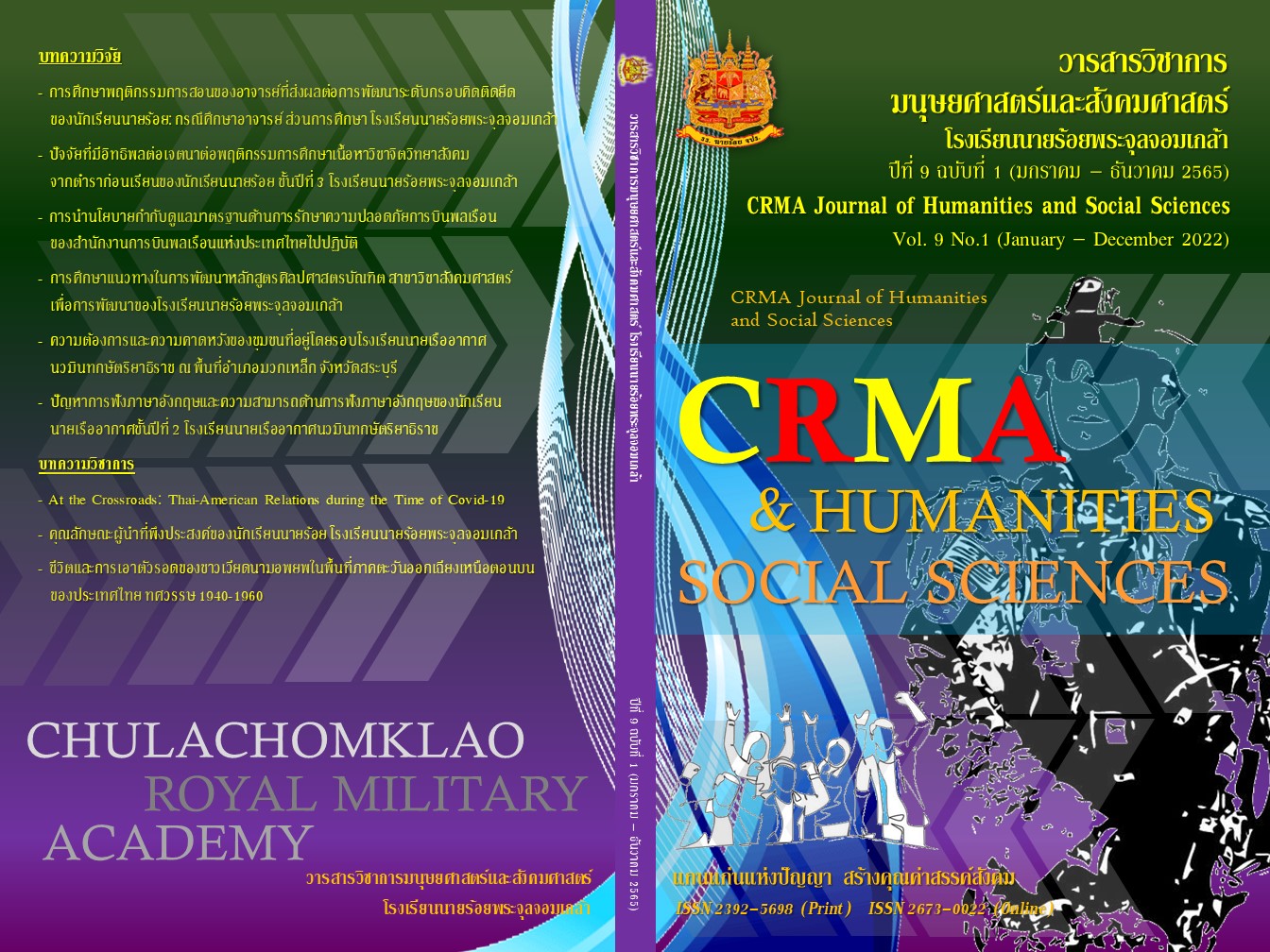The Study of Instructors’ Teaching Behavior Affecting the Development of Cadets’ Growth Mindset: A Case Study of Instructors at the Academic Division, Chulachomklao Royal Military Academy
Keywords:
Teaching Behavior, Growth Mindset, DevelopmentAbstract
This quantitative research aimed to 1) study the teaching behavior of instructors at the Academic Division, Chulachomklao Royal Military Academy that affect the development of growth mindset among cadets; and 2) compare the basic factors of the instructors at the Academic Division, Chulachomklao Royal Military Academy to enhance the growth mindset among cadets. The research samples were 123 instructors, selected by simple random sampling method. The research instrument included a questionnaire developed based on PARA MATTER. The collected data were analyzed by mean values, standard deviations, t-test, and one-way ANOVA.
The research results showed that 1) most of the instructors frequently displayed teaching behavior that affected the growth mindset of cadets by encouraging the cadets to set their own objectives for studying; and 2) from the analysis of basic factors of the instructors, those with academic ranks had higher mean values of the behavior to encourage the cadets to set their study objectives, as well as significantly higher mean values of setting examples for being undaunted by unforeseen problems than those without academic ranks at the level of .05. In addition, instructors with 7-year or more teaching experience had higher mean values of behaving as examples for being resistant to problems and of treating every cadet equally than instructors with 1-6 years of teaching experience. Lastly, science instructors had the lowest level of indomitable behavior, compared to instructors from other academic branches, significantly at the level of .05.
References
นัฐพร เกียรติบัณฑิตกุล. (2563). ความสัมพันธ์ระหว่างกรอบคิดติดยึดและการรับรู้ความสามารถแห่งตนของนักเรียนนายร้อย. ส่วนการศึกษา โรงเรียนนายร้อยพระจุลจอมเกล้า.
เนตรนิยมาศ วรรณพยันต์. (2560). วิถีครูกับการพัฒนากรอบความคิดศิษย์. วารสารหาดใหญ่วิชาการ, 15(2), 185-195.
บุญใจ ศรีสถิตย์นรากูร. (2550). ระเบียบวิธีการวิจัยทางพยาบาลศาสตร์ (พิมพ์ครั้งที่ 4). ยูแอนด์ไอ อินเตอร์มีเดีย.
ปัทมาภรณ์ ศรีราษฎร์. (2561). แนวทางการพัฒนากรอบความคิดแบบเติบโตของครู. วารสารครุศาสตร์จุฬาลงกรณ์มหาวิทยาลัย, 13(1), 389-399.
ปองสิน วิเศษศรี และอารีย์วรรณ สุทธิพงศ์พันธ์. (2563). นิวนอร์มัลในโรงเรียนนายร้อย. วารสารวิชาการมนุษยศาสตร์และสังคมศาสตร์, 7(1), 126-141.
พจนานุกรมศัพท์ศึกษาศาสตร์ร่วมสมัย ฉบับราชบัณฑิตยสภา. (2561, 22 มิถุนายน). พจนานุกรมศัพท์ที่เกี่ยวกับรัฐธรรมนูญ การปฏิรูปประเทศ ยุทธศาสตร์ชาติ ประชารัฐ และประเทศไทย 4.0 ชุดที่ 2. [Status update]. Facebook. https://www.facebook.com/RatchabanditThai/posts/1897231787001574/
พวงชมพู โจนส์. (2559). การสร้างกระบวนการทางความคิด (Mindset) สำหรับบุคลากรในสถาบันการศึกษาระดับอุดมศึกษา. วารสารธุรกิจปริทัศน์, 8(1), 1-9.
มารุต พัฒผล. (2560). การโค้ชเพื่อเสริมสร้าง Growth mindset ของผู้เรียน. มหาวิทยาลัยศรีนครินทรวิโรฒ.
ศิริภพ โสมาภา. (2561). การบริหารหลักสูตรฝึกอบรมเยาวชนเกี่ยวกับแนวคิดเติบโตและการเห็นคุณค่าในตนเอง [วิทยานิพนธ์ปริญญามหาบัณฑิต]. มหาวิทยาลัยธุรกิจบัณฑิตย์.
Alerson, L. (2018, Jan 18). Growth Mindset: The Door to Achieving More. https://www.free-ebooks.net/ebook/GrowthMindset-The-Door-to-Achieving-More
Brock, A., & Hundley, H. (2016). The Growth Mindset Coach: A Teacher’s Month by Month Handbook for Empowering Students to Achieve. Ulysses Press.
Chan, D. W. (2012). Life satisfaction, happiness, and the growth mindset of healthy and unhealthy perfectionists among Hong Kong Chinese gifted students. Roeper Review, 34(4), 224-233.
Dweck, C. S. (2006). Mindset: The new psychology of success. Random House.
Dweck, C.S. (2017). Mindset: Changing the way you think to fulfil your potential. Robinson.
Dweck, C., Walton, G., & Cohen, G. (2014). Academic Tenacity: Mindset and Skills that Promote Long-Term Learning. Bill & Melinda Gates Foundation.
Gawron, H. (2018). Just Ask Us: Kids Speak Out on Student – Engagement. A SAGE Company.
Goldberg, G. (2016). Mindset & Moves: Strategies that Help Readers Take Charge. Corwin.
Marz, K., & Hertz, C. (2015). A Mindset for Learning: Teaching the Traits of Joyful, Independent Growth. Heinemann.
Murphy, M. C., & Dweck, C. S. (2015). Mindsets shape consumer behavior, Journal of Consumer Psychology, 21(1), 22-35.
Swann, W., & Snyder, M. (1980). On translating beliefs into action: Theories of ability and their application in an instructional setting. Journal of Personality and Social Psychology, 38(6), 879-888.
Truax, M. (2018). The Impact of Teacher Language and Growth Mindset Feedback on Writing Motivation. Literacy Research & Instruction, 57(2), 135–157.
Vedder, W. & Fortus D. (2013). Measuring students' continuing motivation for science learning. Journal of Research in Science Teaching, 51(4), 497-522.
Yamane, T. (1973). Statistics: an introductory analysis. Harper & Row.
Downloads
Published
How to Cite
Issue
Section
Categories
License
Copyright (c) 2022 CRMA Journal of Humanities and Social Sciences

This work is licensed under a Creative Commons Attribution-NonCommercial-NoDerivatives 4.0 International License.
The content and information in this journal shall be considered as the individual opinions of the authors. In all cases, the editorial board may not necessarily agree with these opinions or be responsible for them.
The articles and information that are published in the journal are considered to be the copyright of the journal. Any party who wishes to re-publish the journal’s articles must seek permission from the journal’s editor. Articles that receive the agreement for publications must not appear in any other publications prior to their appearance in this journal. The editorial board will send one copy of the journal to each author whose submission was accepted and published.







